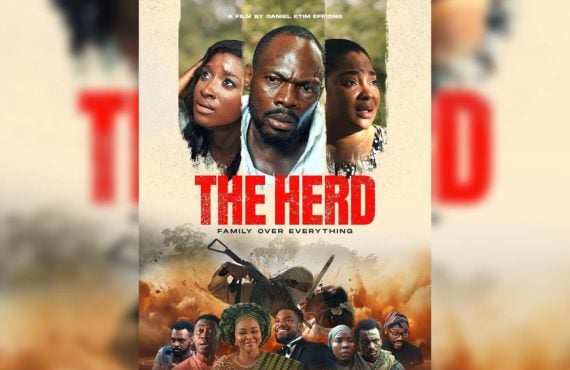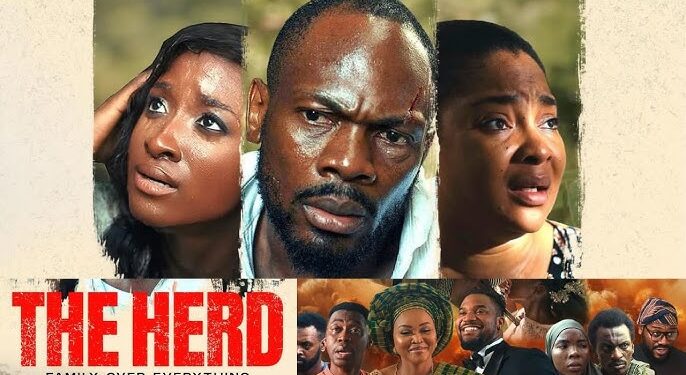Daniel Etim-Effiong makes his debut as a producer with The Herd, a crime thriller that premiered on Netflix on November 21 following a successful run in cinemas. From the outset, the film demonstrates Effiong’s commitment to creating a story that resonates with contemporary Nigerian experiences, particularly the growing fear surrounding insecurity and kidnappings. While the film has its imperfections, it succeeds in delivering a tense, emotionally charged narrative that engages viewers on multiple levels.
A Synopsis of High Stakes and Tension
The Herd tells the story of a joyous wedding celebration that quickly descends into chaos after a dramatic kidnapping. The couple and their guests are thrust into a life-or-death situation, forcing them to confront both their own vulnerabilities and the ruthless reality of Nigeria’s insecurity crisis. The film weaves together themes of love, family, and survival, using the kidnapping as a lens to explore how quickly ordinary life can unravel.

Strengths: Social Relevance and Authenticity
One of the standout features of The Herd is its timeliness and social resonance. By highlighting the issue of banditry and abductions, the film confronts an unsettling reality that many Nigerians face daily. Scenes such as a corps member’s younger brother recounting a previous abduction, only to become a victim once more, starkly illustrate the pervasive and cyclical nature of this threat. These moments ground the film in lived experiences, transforming it from mere entertainment into a commentary on pressing national concerns.
The narrative balance between suspense and emotional depth is another notable strength. By intertwining the harrowing elements of kidnapping with personal stories of love and family, the film avoids becoming a purely action-driven thriller. Instead, it maintains a human dimension, allowing audiences to connect with the characters on an emotional level while remaining invested in the story’s tension.
Performances That Elevate the Story
The acting in The Herd is consistently strong. Ibrahim Abubakar’s portrayal of Anas is a highlight, offering a measured intensity that contrasts effectively with the cold, calculating demeanor of the bandit, Halil. His nuanced performance conveys anger, hatred, and motivation without overacting, lending credibility to the character.
Linda Ejiofor also delivers a compelling performance, particularly in her solo scenes. She imbues her character with a depth and vulnerability that makes her emotional journey relatable. Across the board, the cast demonstrates a professional commitment to their roles, creating an ensemble that feels authentic and grounded, which is essential for a thriller of this nature.
Technical Execution: Sound, Cinematography, and Effects
From a technical standpoint, The Herd meets the expectations of a crime thriller. The film’s special effects, particularly during gunfight sequences, are convincing and contribute to the realism without feeling exaggerated. Scenes depicting violence and bloodshed are handled with care, offering intensity without veering into gratuitousness. The editing complements the performances, ensuring that dialogue and action are well-synced, enhancing the immersive quality of the film.
Cinematography stands out as one of the film’s strongest assets. The camera work skillfully builds suspense without disorienting the viewer, while night scenes are well-lit to maintain clarity without sacrificing the dark, tense atmosphere. Sound design and musical choices further enhance critical moments, heightening tension and adding emotional depth.
Tackling Sensitive Themes
The film does not shy away from portraying the complexities of Nigerian society, including ethnic and religious dynamics. While some may critique its representation of certain groups, the film avoids generalization, showing wrongdoing across multiple communities. This nuanced approach underscores that insecurity and violence are societal problems shaped by individual actions rather than specific identities.
Weaknesses: Narrative Gaps and Plot Inconsistencies
Despite its strengths, The Herd is not without flaws. Several subplots are underdeveloped or left unresolved, which can disrupt the narrative flow. For instance, Gosi’s embezzlement of his company’s funds is introduced but never fully explained, leaving viewers to wonder about his motivations and intended outcomes. Similarly, the fate of other victims intertwined with the main characters’ storyline is largely unaddressed, creating a sense of incompleteness.
Other subplots, such as Gosi’s parents pressuring his wife to divorce him after paying the ransom, feel rushed and lack adequate contextual support. Additionally, minor inconsistencies in the storyline—like the change in the ransom collection location from Kogi to Ekiti—can be distracting and slightly undermine the film’s overall tension.

Final Verdict
The Herd earns a rating of 6/10. While it succeeds in raising awareness about Nigeria’s security challenges and delivers a compelling emotional core, its narrative gaps and minor inconsistencies prevent it from reaching its full potential. Nevertheless, Daniel Etim-Effiong’s debut as a producer demonstrates promise, particularly in his ability to craft a film that is socially conscious, technically sound, and emotionally engaging. For viewers seeking a thriller rooted in real-world issues, The Herd is worth watching.

















